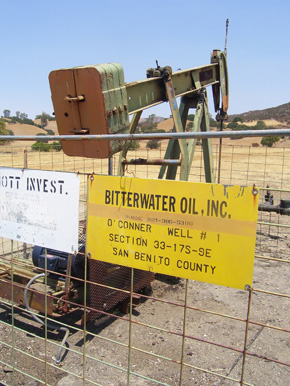County supervisors were apt to portray a sense of support for oil and natural gas prospects here, but they fell short as it pertains to protecting taxpayers in the event of a necessary cleanup.
After nearly a year of conjecture – sparked by surveying done last summer to prospectively tap natural gas from the ground in Aromas – supervisors last week gave initial approval to a more expansive set of rules for resource extraction. While any type of legislation done at the county level faces the prospect of being overshadowed by state law – especially considering how speculation has recently amplified about the potentially vast, future prospects of the Monterey Shale formation – the county ordinance sends a message that local officials will respond to residents’ concerns, but in a reasonable manner that does the least amount of damage possible to the economy.
Although the county appropriately included required water monitoring as a component of the new rules, debate among officials last week – at the end stage of putting together the ordinance – largely focused on the amount of the bond that would be set aside for any needed cleanup.
Board members initially considered a $15,000 cleanup bond per well, an amount favored by the anti-oil crowd, but ended up approving the ordinance requiring the $15,000 bond for each “facility” – defined by the county as up to 36 wells.
That sudden change at last week’s meeting – it first came up after the public comment period closed, preventing a response from the opposition – upset the Aromas contingent, and rightfully so.
Supervisors Anthony Botelho and Robert Rivas were justified to scoff at the amount and oppose the provision as stated, though Rivas mischaracterized the vote when he implied it was a sign of pandering to “big oil” – because local oil interests to this point have been driven by relatively small operations.
Supervisor Jerry Muenzer, who has been paid by oil interests to survey his family’s Tres Pinos property, proposed the significantly lowered bond amount. He contended that the state holds financial responsibility for any oil cleanup and that bond funds would go toward peripheral costs such as oversight of the state’s work.
Muenzer’s rationale is off base for a couple of reasons. For one, does anyone trust the state these days when it comes to financial obligations? More important, even if merely considering potential oversight costs, those dollar amounts would add up quite rapidly in the event of a major disaster and could easily surpass the $15,000. If considering any cleanup costs could possibly fall into the county’s lap, that $15,000 bond amount would just about cover the cost of driving a few trucks onto the site and immediately driving them off the site while skipping the actual work.
Either way, as the county moves forward, it is important that the new set of rules are not discouraging natural resource exploration in San Benito County.
With the exception of the watered-down bond amount, which supervisors can certainly reconsider as a retooling to the rules at some point, the ordinance should serve to properly clarify the process of drilling for oil in the county.








